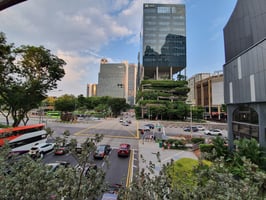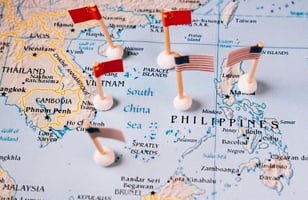‘Initial phase’ of Indonesia's 2024 elections will begin on Jun 14: President Joko Widodo...
Kusu News 2-Nov-2-21
Microsoft to shut down LinkedIn website in China as internet censorship increases in the country
14-Oct-2021 CNBC
Microsoft announced Thursday it will shut down its local version of LinkedIn in China as the country continues to expand its censorship of the internet.
LinkedIn was the last major U.S. social network still operating in China, which has some of the strictest censorship rules. Social media platforms and websites like Twitter and Facebook have been blocked for more than a decade in the country, while Google decided to shutter operations in 2010.
Microsoft said it would shut down LinkedIn due to a “significantly more challenging operating environment and greater compliance requirements in China.” Instead, Microsoft will launch a job search site in China that doesn’t have LinkedIn’s social media features.
The news comes after a Chinese internet regulator told LinkedIn in March to better moderate its content and gave it a 30-day deadline, The Wall Street Journal reported Thursday.
Last month, LinkedIn blocked several U.S. journalists in China, citing “prohibited content” in their profiles. The profiles of academics and researchers have also been reportedly blocked on the platform in China in recent months.
Apple chip shortage will end, but U.S.-China supply chain ‘train wreck’ is coming
29-Oct-2021 CNBC
The semiconductor chip shortage is old news, but when the second-largest public company in the history of the U.S. stock market says it just left $6 billion in potential sales on the table as a result of limited chip supply — as Apple just did — it reinforces why the U.S. economy needs to rethink how it sources its semiconducting technology so that doesn’t happen again. This short-term supply chain phenomenon will pass, but tech executives and policy advisors say the future may be one of even larger, longer-term supply chain shocks. A shift from decades during which the largest companies benefitted from a manufacturing model in which “designed in California” and “assembled in Asia” was king needs to occur to shore up the supply of key components.
From $2 trillion Apple to $1 billion lidar sensing technology marker Ouster, the supply chain policy of industry and government needs to change.
Mark Frichtl, co-founder and chief technology officer at Ouster, said as the maker of products that have dozens or hundreds of integrated parts, it needs to manage and make sure it can get all of those. “Anyone making electronic devices has to do that,” he said, and it is now a global problem affecting all industries, whether phones or cars or Lidar sensors.
World 'much worse off' if global economy splits into rival camps, says Tharman in dialogue with US
2-Nov-2021 The Straits Times
SINGAPORE - Singapore's Senior Minister Tharman Shanmugaratnam believes that it is possible to diversify supply chains for better risk management, remain an open economy while catering good jobs and, at the same time, avoid bifurcation of the world into rival camps of trade and technology.
In a one-on-one virtual dialogue with the United States' Secretary of Commerce Gina Raimondo, Mr Tharman said the world will be "much worse off" if the global economy splits.
The dialogue, held late on Monday (Nov 1), was organised by the Lee Kuan Yew School of Public Policy and American think-tank Peterson Institute for International Economics (PIIE). It was part of the webinar Supply Chains In A World Of Conflict And Covid-19 and was moderated by PIIE president Adam Posen.
Ms Raimondo, however, underlined her government's mistrust of China's trade practices and instead put forward US President Joe Biden's vision of an Indo-Pacific economic framework which will bring together what she called like-minded and trusted partners across the region, including Singapore.
She also coined a new term "friend-shoring" while referring to a US policy shift towards the Indo-Pacific region.
A Green Deal at COP26 Can’t Be a Green Light for China
The idea that appeasing Beijing can save the planet is a fantasy
1-Nov-2021 Foreign Policy
The Biden administration has set high expectations for itself as the United Nations climate change summit in Glasgow, Scotland, known as COP26, begins. During his presidential run, Joe Biden’s campaign website declared that there was “no greater challenge facing our country and our world” than climate change.” The U.S. president’s climate envoy, John Kerry, recently called the summit the world’s “last best hope” to avoid disaster. Activists are calling for dramatic action: the young climate campaigner Greta Thunberg said that it is time to “uproot the system,” fundamentally overhauling the domestic and foreign policies of countries everywhere.
Yet the Biden administration needs to tread carefully, lest it stumble into a trap. At COP26 and after, the administration will face pressure—from within and without—to make diplomatic concessions to China as the price of Chinese President Xi Jinping’s cooperation on climate. If Biden does so, he risks exposing the United States to a danger as significant as that posed by a changing climate: losing an intensifying conflict with Beijing. America is already confronting a new cold war that could well become a hot war, and winning that contest must be its guiding priority.
It should also recognize a simple reality: The United States won’t be able to lead on any global issue, climate included, if it doesn’t defend the international system it has led since World War II against the challenge posed by China.
-1.jpg?width=146&height=50&name=Kusu%20(1)-1.jpg)



